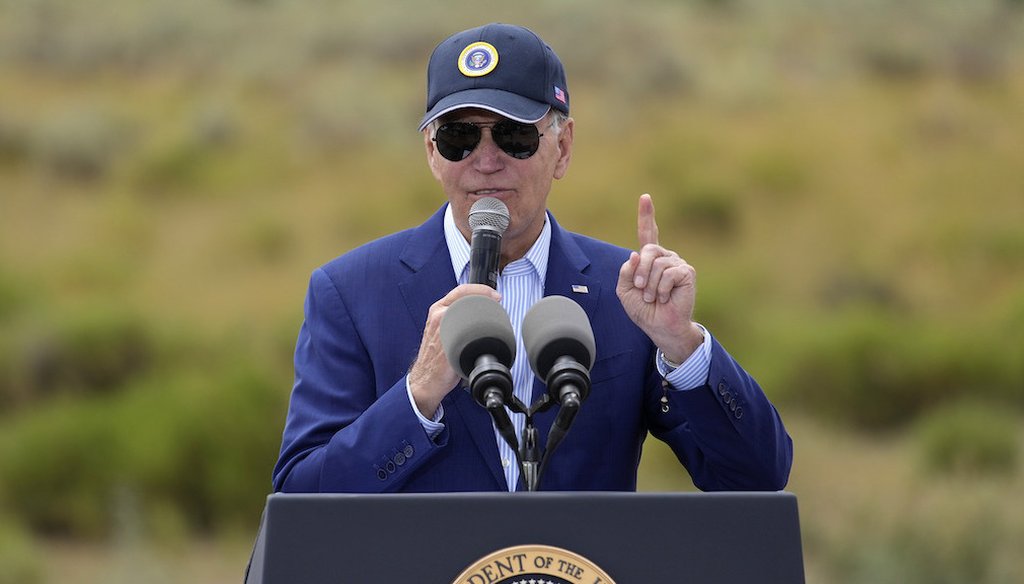Stand up for the facts!
Our only agenda is to publish the truth so you can be an informed participant in democracy.
We need your help.
I would like to contribute

President Joe Biden speaks at the Red Butte Airfield in Tusayan, Ariz., on Aug. 8, 2023. (AP)
Joe Biden says he declared a national climate emergency, but he hasn’t
If Your Time is short
-
Although Biden has signed legislation and taken executive actions intended to curb climate change, he has not signed a formal emergency declaration.
-
Many environmental groups and some lawmakers have urged him to take that step, saying it would give him a freer hand to implement policies to curb climate change.
President Joe Biden touted his efforts to stem climate change on a trip to the Grand Canyon in Arizona.
In an Aug. 9 interview, Stephanie Abrams, a Weather Channel meteorologist, told Biden that the World Health Organization projects climate change will cause an additional quarter million deaths a year starting in 2030.
"Are you prepared to declare a national emergency with respect to climate change?" Abrams asked.
Biden responded, "I’ve already done that. … We’ve conserved more land. We’ve … rejoined the Paris climate accord. … We’re moving. It is the existential threat to humanity."
Abrams then asked Biden again whether he had declared a national climate emergency.
After swatting a bug off Abrams’ shirt, Biden responded, "Practically speaking, yes."
Many environmentalists have applauded Biden’s policies on climate change, including the clean infrastructure funding in the bipartisan infrastructure bill and the Inflation Reduction Act.
Biden was visiting Arizona to announce the Baaj Nwaavjo I’tah Kukveni/Ancestral Footprints of the Grand Canyon National Monument, which conserves 1 million acres of land near the Grand Canyon that Indigenous people consider sacred.
But he has not declared a national climate emergency.
What would a national climate emergency do?
Environmental groups have been urging Biden to take this step. The March to End Fossil Fuels, a coalition of dozens of environmental and other progressive groups, listed a national emergency declaration as one of several demands of Biden, hoping it would halt fossil fuel exports and lead to more renewable energy.
Legislation is pending in Congress to urge Biden to declare a national climate emergency. The House version, offered by Rep. Earl Blumenauer, D-Ore., has 79 co-sponsors, all Democrats. The Senate version, offered by Sen. Bernie Sanders, I-Vt., has six Democratic co-sponsors. A similar effort during the previous Congress failed, and the odds are considered long in the current Congress, too. In any case, the resolution would be nonbinding.
Environmental reform supporters in Congress and the environmental movement say that as president, Biden could implement powers granted under three laws to respond more forcefully to climate change: the National Emergencies Act, the Defense Production Act, and the Stafford Disaster Relief and Emergency Assistance Act.
Using the National Emergencies Act, Biden can reinstate a ban on crude oil exports that Congress lifted in 2015, said Kassie Siegel, director of the Climate Law Institute at the Center for Biological Diversity, one of the groups urging Biden to act.
Biden can reinstate the crude oil export ban on a year-by-year basis, Siegel said. "The only prerequisite is the national emergency declaration," she said.
Biden could also invoke the Stafford Act to deem heat a major disaster event. (The act lets presidents access money and disaster relief assistance set aside by Congress.)
"This will allow states to access more heat-relief funds for things like cooling and water centers in areas accessible to those most affected by heat, including poor and unhoused people, as well as agricultural and other workers." Siegel said. "These funds could also be used to build out resilient clean energy systems."
Using the Defense Production Act, Biden has already sought to leverage federal procurement to manufacture renewable energy and clean transportation technologies, citing "U.S. national and climate security" concerns. But this did not require invoking a climate emergency.
Siegel’s group also believes Biden could use disaster powers to suspend oil and gas drilling in the outer continental shelf and restrict international trade and private investment in fossil fuels. It urged him to do so as early as December 2020, shortly after he was elected.
Although some of the biggest environmental groups have backed the push for a climate emergency declaration by partnering with the March to End Fossil Fuels, including the Sierra Club and Greenpeace, others have not, including Earthjustice, the Environmental Defense Fund, Friends of the Earth, the National Audubon Society, the Natural Resources Defense Council and the Nature Conservancy.
Legal experts say a climate disaster declaration might not withstand scrutiny at the U.S. Supreme Court. The court is increasingly critical of efforts to extend presidential authority in cases that are not explicitly authorized by Congress.
"I think that makes it iffy whether the Supreme Court really would allow sweeping use of any of these emergency powers in a climate emergency," Dan Farber, an environmental law professor at the University of California, Berkeley, recently told the environmental publication Grist.
Asked for evidence to back Biden’s claim, the White House press office focused on the other policies Biden has implemented on climate change, including returning the U.S. to the Paris climate accords, the climate-related provisions of the infrastructure bill and the Inflation Reduction Act, and his use of the Defense Production Act for renewable energy technologies.
Our ruling
Biden said he has "already" declared a national climate emergency.
Biden has not signed a formal emergency declaration, a step that many environmental groups and some lawmakers have been urging him to take.
We rate the statement False.
Our Sources
Joe Biden, interview with The Weather Channel, Aug. 9, 2023
Joe Biden, interview with The Weather Channel, Aug. 9, 2023
White House, "Fact Sheet: President Biden Designates Baaj Nwaavjo I’tah Kukveni – Ancestral Footprints of the Grand Canyon National Monument," Aug. 8, 2023
U.S. Energy Department, "President Biden Invokes Defense Production Act to Accelerate Domestic Manufacturing of Clean Energy," June 6, 2022
March to End Fossil Fuels, accessed Aug. 16, 2023
March to End Fossil Fuels partner organizations, accessed Aug. 16, 2023
People vs. Fossil Fuels, post on X, Aug. 15, 2023
Congress.gov, House version of climate emergency resolution, accessed Aug. 16, 2023
Congress.gov, Senate version of climate emergency resolution, accessed Aug. 16, 2023
Center for Biological Diversity, "The Climate President’s Emergency Powers," February 2022
Center for Biological Diversity, "Biden Urged to Sign Climate Emergency Executive Order," December 2020
Grist, "What it might look like if President Biden really declared a climate emergency," Aug. 14, 2023
CNN, "Biden incorrectly claims he has declared a national emergency on climate," Aug. 9, 2023
Email interview with Kassie Siegel, director of the Climate Law Institute at the Center for Biological Diversity, Aug. 15, 2023
Statement to PolitiFact from the White House, Aug. 17, 2023
Browse the Truth-O-Meter
More by Louis Jacobson
Joe Biden says he declared a national climate emergency, but he hasn’t
Support independent fact-checking.
Become a member!
In a world of wild talk and fake news, help us stand up for the facts.






































